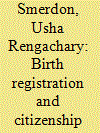|
|
|
Sort Order |
|
|
|
Items / Page
|
|
|
|
|
|
|
| Srl | Item |
| 1 |
ID:
195215


|
|
|
|
|
| Summary/Abstract |
The article examines the contested aspects of neoliberalism through cinematic narratives, addressing the issue of Assisted Reproductive Technology (ART) in India, a debated subject in socio-legal spheres. Existing literature extensively discusses the biopolitical and bioethical dimensions of commercialization and commodification, particularly concerning organ, egg, sperm donations, and gestational commercial surrogacy. This research endeavors to scrutinise and appraise the ethical quandaries emanating from the technological transformation of motherhood, as portrayed in fictional representations. These narratives shed light on the difficult situations faced by surrogates and egg donors, who are often driven by familial or socio-economic pressures to provide their reproductive services. Consequently, they become commodified within the context of India's In Vitro Fertilization (IVF) industry. Ergo, through the films I Am (2010) and Mimi (2021), this article probes into the intertwining socioeconomic situations of the large percentage of infertile women and claims that the positive discourse around the ‘new Indian women’ is inherently diluted and undermined. Additionally, the research emphasizes that ART—and more importantly, a new agency for single women—is reiterated within the political and socio-historical contexts of the films discussed.
|
|
|
|
|
|
|
|
|
|
|
|
|
|
|
|
| 2 |
ID:
114599


|
|
|
|
|
| Publication |
2012.
|
| Summary/Abstract |
International surrogacy arrangements have created paradoxical situations of 'legal orphanhood' where highly desired surrogate babies with multiple parents are not recognized by either the child's country of birth or the country of the child's commissioning parent(s). This article examines the parentage and citizenship status of children born to Indian surrogate mothers and foreign commissioning parent(s). In the absence of comprehensive legislation, Indian courts have struggled to address these fundamental issues of surrogate babies given the differing interests of the parties and countries involved. The rights of surrogate children are addressed only on an ad hoc basis and only after the commissioning parents encounter actual difficulties in taking children to another country. By viewing the rights of the surrogate child as paramount, surrogate children born through surrogacy arrangements in India should have their origins known and documented accurately to preserve their identity. In addition, Indian citizenship should automatically attach at birth to prevent statelessness. Contrary results place the interests of other parties above the rights of the child.
|
|
|
|
|
|
|
|
|
|
|
|
|
|
|
|
| 3 |
ID:
143548


|
|
|
|
|
| Summary/Abstract |
Every year, large numbers of aspiring parents from all over the world come to India to fulfil their dreams of parenthood. They hire an Indian surrogate and with the help of state-of-the-art medical technology, they are able to conceive children they can call their ‘own’. Since 2005, commercial gestational surrogacy in India has become a lucrative industry thanks to the cheap gestational labour, and cheaper medical services. However, this largely unregulated industry is facing roadblocks in international bureaucratic processes. The child born from the arrangement is often caught between conflicting international laws and deemed ‘stateless’. I wish to look at how the state and international laws tend to define persons and relationships by regulating entry and exit, especially through verification and authentication of kin. The world of transparent and visible boundaries – and their policing – is seen through the transnational processes of identifying the stateless children born through the arrangement.
|
|
|
|
|
|
|
|
|
|
|
|
|
|
|
|
| 4 |
ID:
107948


|
|
|
|
|
| Publication |
2011.
|
| Summary/Abstract |
What, if any, is the problem with treating bodies as objects or property? Is there a defensible basis for seeing bodies as different from "other" material resources? Or is thinking the body special a kind of sentimentalism that blocks clear thinking about matters such as prostitution, surrogate motherhood, and the sale of spare kidneys? I argue that the language we use does matter, and that thinking of the body as property encourages a self/body dualism that obscures the power relations involved in all contracts that cedes authority over the body. Recognising the self as embodied, however, also makes it harder to insist on sharp distinctions between activities that involve the body and those that "just" involve the mind, hence harder to justify refusing payment for explicitly body services while condoning it for those to which the body is more incidental. I therefore provide a modest defence of monetary compensation for those who "donate" bodily products or services. Compensation does not, however, mean markets for there is at least one sense in which the body is special. This is that more so, and more intrinsically than other markets, markets in body parts or bodily services depend on inequality. I use this to make a case against such markets.
|
|
|
|
|
|
|
|
|
|
|
|
|
|
|
|
|
|
|
|
|